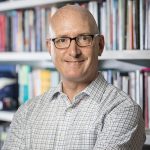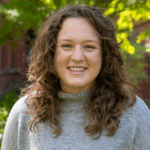Elizabeth Meza recently published a commentary in Community College Daily on her research around tuition and fees comparisons between bachelor’s degrees offered by community colleges and those offered by public universities and for-profit institutions. Meza finds that community college baccalaureate (CCB) programs are becoming an increasingly viable and affordable option for students seeking four-year degrees. Research across 13 states shows that CCB programs significantly reduce costs, with median tuition at $4,820 annually compared to $9,390 at public universities and $19,097 at for-profit institutions. In some states, such as Texas, CCB tuition is less than half the cost of a public university, making higher education more accessible to lower-income students. These programs serve diverse populations, particularly students of color and working adults balancing education with family and job responsibilities. While tuition models vary by state, most CCB programs maintain affordability by keeping costs close to those of associate degrees. As these programs continue to expand nationwide, they offer a pathway for students who might otherwise find a bachelor’s degree financially difficult.This research was presented at the annual Community College Baccalaureate Association Conference.
Category: Research Item
Student Consulting Lab Project on Behavioral Health Quoted in Seattle Times
The Evans School Student Consulting Lab (SCL) pairs MPA students and faculty advisors with public, private, and nonprofit partners to co-create solutions to policy and organization problems. A recent “Seattle Times” article cited research done by Brad Blackburn, Hope Kalegi, and Mahdya Aldahnim – all MPA ’23 – as part of their project “Landscape of Behavioral Health Crisis Interventions for U.S. Campus Populations.”
“Programs that send mental health professionals to respond to crises as a supplement to or replacement for police officers have grown in recent years. Seattle is planning to expand its pilot program that sends crisis responders to some 911 calls. King County recently expanded its program that sends mobile crisis teams, dispatched by 988 calls, to mental health emergencies around the county.
Applying the idea to college campuses is newer. A 2023 report from students at UW’s Evans School of Public Policy and Governance identified similar crisis response programs at eight universities around the country; the oldest program, at Johns Hopkins University, launched in August 2021.”
Read the full article: https://lnkd.in/gQrMQ-XW
Five Questions with Vanisha Sharma
Vanisha Sharma joined the Evans School of Public Policy & Governance this summer as a postdoctoral scholar within the Evans School Policy Analysis and Research Group (EPAR). She has a Masters in Public Administration (MPA) and a Ph.D. in Applied Economics from Cornell University. Her research program focuses on the digitization of developing, rural communities. And a fun fact – former Evans faculty Brian Dillon was on Vanisha’s dissertation committee.
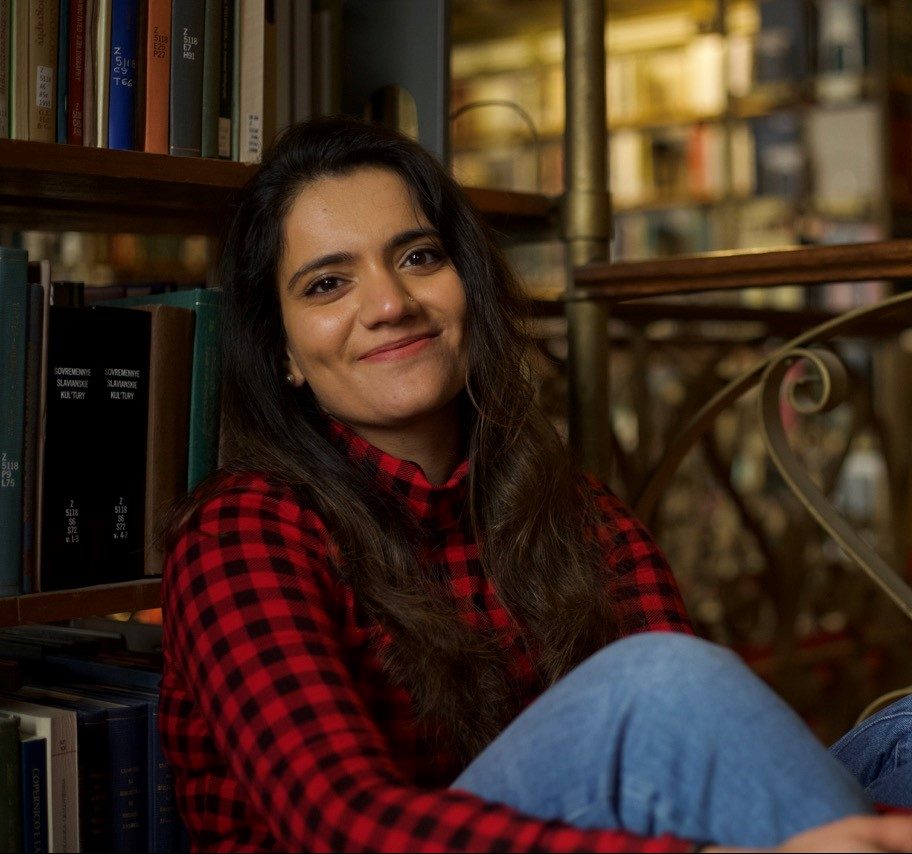
The Evans School sat down with Vanisha in late-summer, after she had a chance to settle into Seattle, EPAR, and the Evans School.
Evans: Great to have you join our community at the Evans School! Much of your work examines the impact of digitization and internet expansion in rural India. What drew you to this area of research?
VS: Thank you! I moved out of India for my undergraduate degree at the University of Hong Kong more than a decade ago, where I majored in Economics and double-minored in Psychology and Sociology. Every time I visited back home, I would see a slightly greater expansion of digitization as compared to when I left. The expansion started with increasing rates of adoption of mobile phones in both urban and rural areas, and then subsequently spread to applications of smartphones such as mobile payments, linking bank accounts and social security to your mobile phone, and even agricultural advisory! This fascinated me, especially since information constraints present significant barriers to economic development, and digitization, especially digital information dissemination, is a cost-effective way to potentially address this issue. That’s how I got excited about exploring the possible consequences of expanding digitization on the Indian economy!
Evans: You recently completed an impressive review of the literature examining evidence around the potential impact of digital, or data-driven, agriculture on promoting sustainable food systems. Are there any findings from this review that stood out as particularly important?
VS: I would say the most prominent finding with digitization in agriculture and food systems is the shift of focus in literature from increasing productivity to climate resilience. With the urgency of unpredictable weather shocks, in the recent years, papers have increasingly focused on strategies that not only help improve agricultural productivity, but also make agriculture and food systems more resilient to climate shocks. Another important finding was the lack of literature on digital sustainable agriculture in developing countries, many of which are expected to face the brunt of climate shocks. Due to lack of infrastructure and investment in lower income countries, most of the empirical evidence on successes of digital agriculture are skewed because the studies are conducted in the richer countries.
Evans: One of your dissertation papers used a clever experimental design that examined how social media exposure and in-person peer interactions shaped how farmers exchanged information. Tell us more about this study design.
VS: For this paper, my goal was to estimate the effect of WhatsApp usage on farm outcomes for farmers in rural India, and compare online interactions to in-person interactions. As you can imagine, self-selection into our social networks makes causal inference of social media very challenging since members of a specific social group share many other unobservable traits that can affect outcomes. To address this, I conducted a 2-stage randomized control trial design. Since farmers within each village already know each other, in the first stage, I randomized 108 villages and for the second stage, we randomly sampled 10 farmers within each village. This allowed me to create multiple WhatsApp groups for farmers from non-neighboring villages while maintaining the balance in the control and treatment arms. Given that the experiment was conducted in the midst of Covid-19, I had to take extra precautions to ensure the safety of the farmers and my enumerating team.
Evans: Were there any unexpected lessons or surprising findings in this experiment?
VS: Yes! My favorite surprising finding was that farmers who were given an opportunity to meet in-person, in addition to on WhatsApp groups, shared more market-relevant information online! This implies that having an in-person connection definitely allows for better market-related communication online, at least in the context of rural south India. Aside from the technical details of the experiment, I learned several unexpected lessons about survey design, budgeting, and managing an enumerating team of 13! The most impactful and unexpected lesson for me was the importance of working around the availability of survey respondents. In a hot and sunny location such as Madanapalle in rural south India, farmers work early mornings and late evenings. For this reason, we would leave our office at 6am every day to reach the farmers before they left for their fields, so the respondents had the cognitive capacity to respond, and this also ensured reliability of our results.
Evans: Tell us about the work you’ve started with EPAR.
VS: I’m happy to be involved in several projects at EPAR and feel so motivated to help move them forward! I’m leading a collaboration with the Borlough Institute of South Asia, where we are using spatial econometrics and machine learning to map out the costs and benefits of climate adaptation strategies, and heterogeneity in climate adaptation by gender, for all countries in South Asia. I’m also working on a project to estimate the effects of foreign aid through the Gates Foundation on inclusive agricultural transformation India. Additionally, I’m part of a team developing a data visualization tool for the Cambodian government which helps link theoretical policy predictions to real-world data to better inform policy makers as part of the 50X2030 initiative.
Evans: Thanks for chatting – welcome again to the Evans School!
VS: Thank you!
NOVA Highlights Research by EPIC on Ballot Rejection Rates
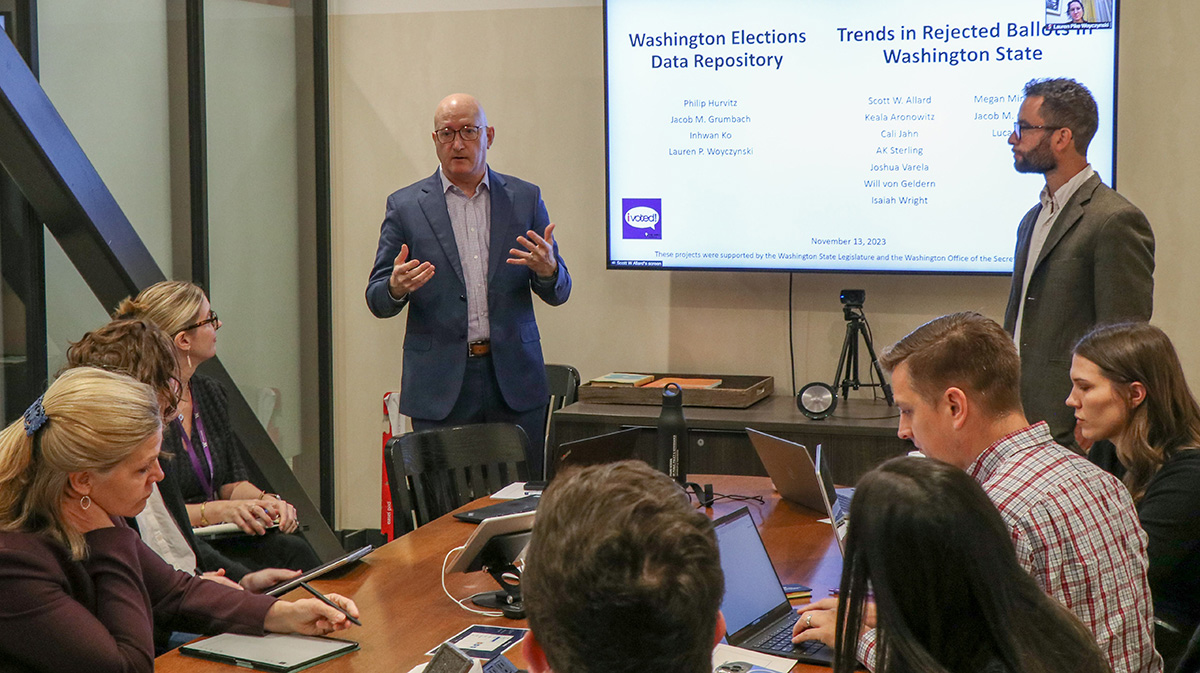
Washingtonians have been voting by mail for over a decade and voter turnout in Washington routinely is among the highest in the country. Despite the success of vote-by-mail, a research study by the Evans School of Public Policy & Governance at the University of Washington examined why ballots are rejected to improve the voter experience and inform efforts by state and county leaders to continue to reduce the number of ballots rejected in any election.
The Evans Policy Innovation Collaborative (EPIC) worked alongside the Secretary of State’s Office to explore ballot signature verification practices along with investigating individual voters’ understanding and communication around the signature verification process, and education and outreach methods. Through an analysis of voter- and county-level ballot data from the past 10 years of primary and general elections along with engagements, interviews, and surveys of county elections staff, individual voters, and community organizations, and the added help of a project advisory board, several key findings about voters’ experiences with vote-by-mail in Washington emerged –
Between 2012 and 2022, Washington State voters cast nearly 45 million ballots in primary and general elections. Annually, 25,000 to 35,000 ballots are rejected, primarily due to late arrival, and some for missing or mismatched signatures (0.5 to 0.6% of all ballots). There is evidence that voters of color often have higher ballot rejection rates than White voters. Voters of color, such as Hispanic and Asian voters, faced rejection rates double that of White voters in the 2020 General Election. Black voters experienced rejection rates 50% higher than White voters. Male-identifying voters and younger voters also had higher rejection rates, with nearly 5% of ballots from voters aged 18-25 being rejected in the 2022 general election. About 60% of ballots with signature issues have been corrected before final results are submitted since 2020.
NOVA and Northwest Public Broadcasting, launching a series on the significance and impact of data grabbed onto the importance of this work, particularly around the methods researchers employed to estimate race. Since Washington State does not collect racial data alongside voter registration, the study had to impute race to understand racial trends. While estimating race is not perfect, it is critical that we look at data to better understand how our systems, like electoral systems, impact and serve all people. All Washington voters should feel empowered and knowledgeable to vote.
The study concluded with a number of recommendations to improve the voter experience in Washington State and hopefully improve ballot rejection rates, including creating a universal ballot envelope design for all Washington counties, forging a stronger role and relationships with community-based organizations, encouraging increased opportunities for voters to update their signature on record, pursuing evaluation of innovative practices like text messaging and automatic signature verification, as well as plenty of opportunities for future research.
Wolfle Action Lab @EPIC
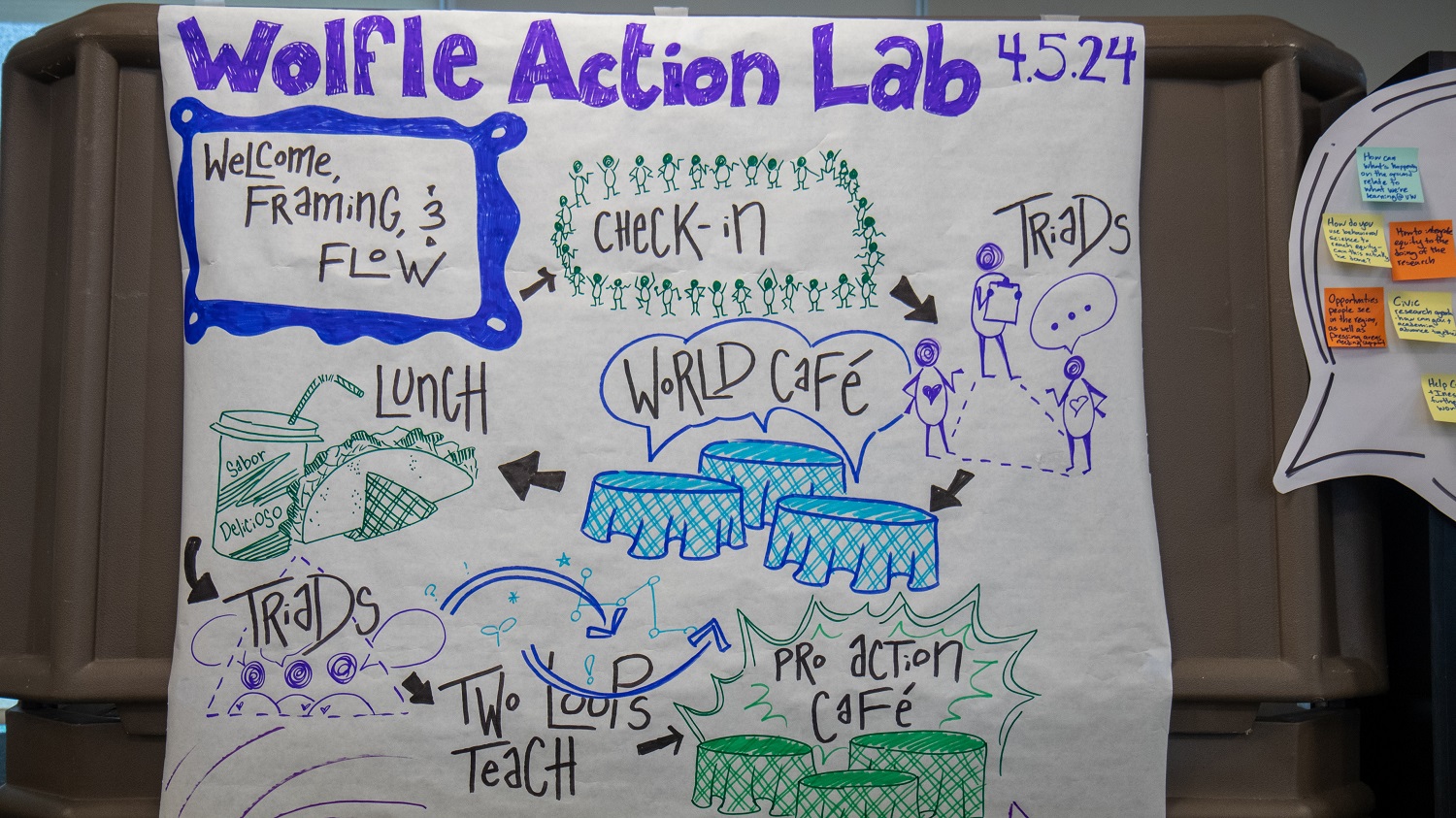
The Wolfle Action Lab @EPIC is an important way to engage faculty in the school’s mission to “host communities to co-create solutions to pressing societal problems.” It’s premised on the idea that dialogue and exchange across diverse fields of expertise is necessary for the development and adoption of solutions. The Action Lab draws upon the skilled facilitation tools of EPIC – Evans Policy Innovation Collaborative – staff to host sessions where researchers, practitioners, those with expertise from lived experiences, and policymakers engage in meaningful dialogue across differences. More than simply sharing ideas, research findings, and perspectives, Wolfle Action Labs are intended to develop collaborative planning for program or system redesign, implementation strategies that can be administered in real-time, and feasible policy recommendations. The Wolfle Action Lab convenings and projects operates consistently with the Evans School’s values of equity, courage, and public service.
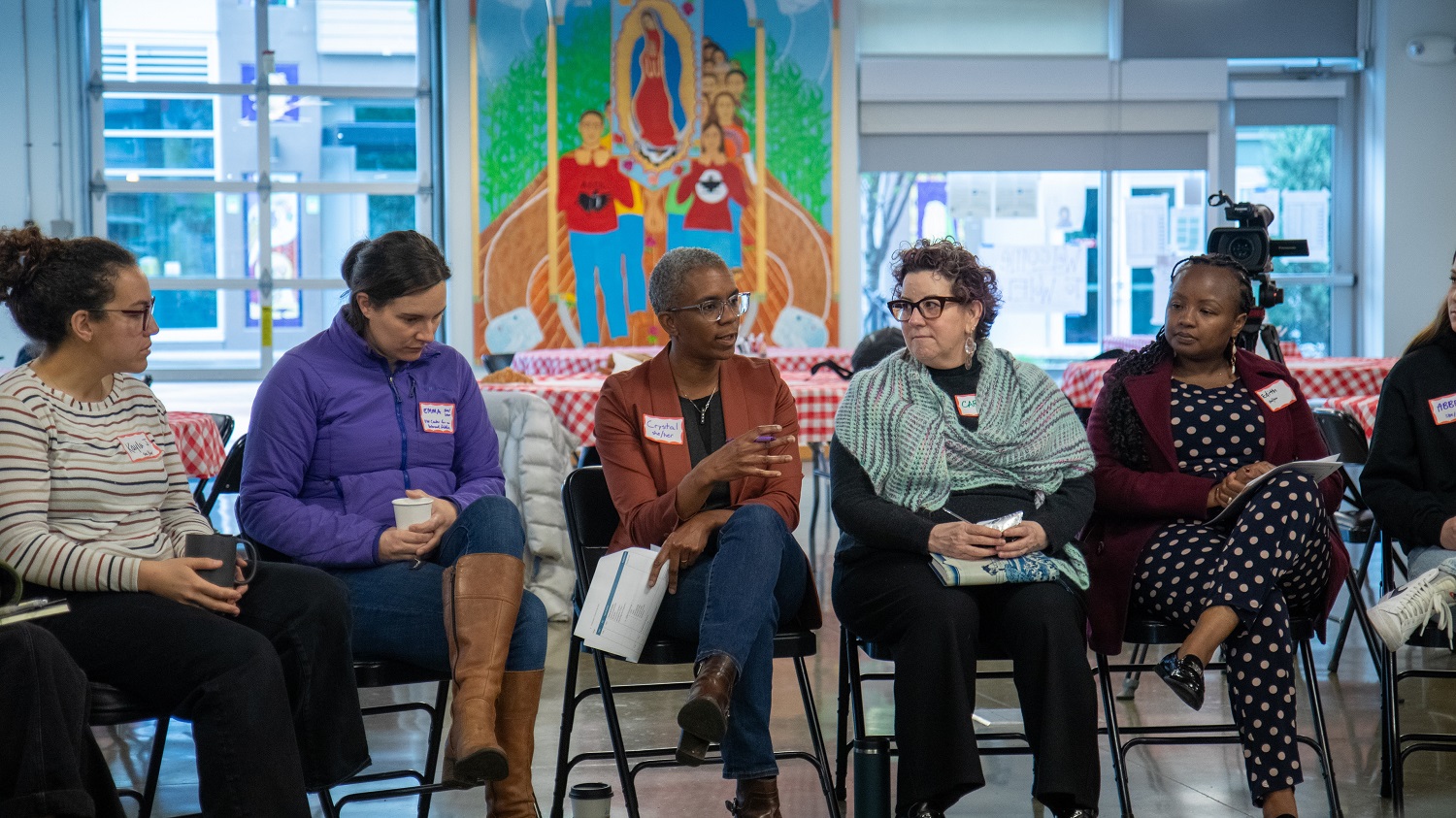
On April 5, 2024, Evans School faculty members Crystal Hall and Ines Jurcevic and the EPIC team hosted the inaugural Wolfle Action Lab convening at El Centro de la Raza. They gathered with people from community-based organizations, academia, and government to spark learning, share promising practices, and make authentic connections that seed relationships among people leading equity and behavioral science to enable community-informed change in the public interest. Throughout the day they engaged in various small group discussions around the following questions:
- When and why did you step into this work?
- What is the environment you are working in?
- What are the challenges you confront in trying to change the way you work to better incorporate an equity lens?
- What successes have you experienced bringing an equity or behavioral science lens to your work?
- What are opportunities you see in front of you to integrate your commitments to equity-based work with behavioral science?
- How does your own Identity shape your ability to lead change in your context?
These conversations centered around working to effect systems change were followed by a group teach and discussion on Two Loops – a framework for describing how systems rise and fall, as well as types of roles that often occur as this process unfolds. They wrapped up the afternoon with another conversation process called Pro Action Café, where participants had the opportunity to call on the collective wisdom of the group with calls, questions, or projects they wanted to workshop.
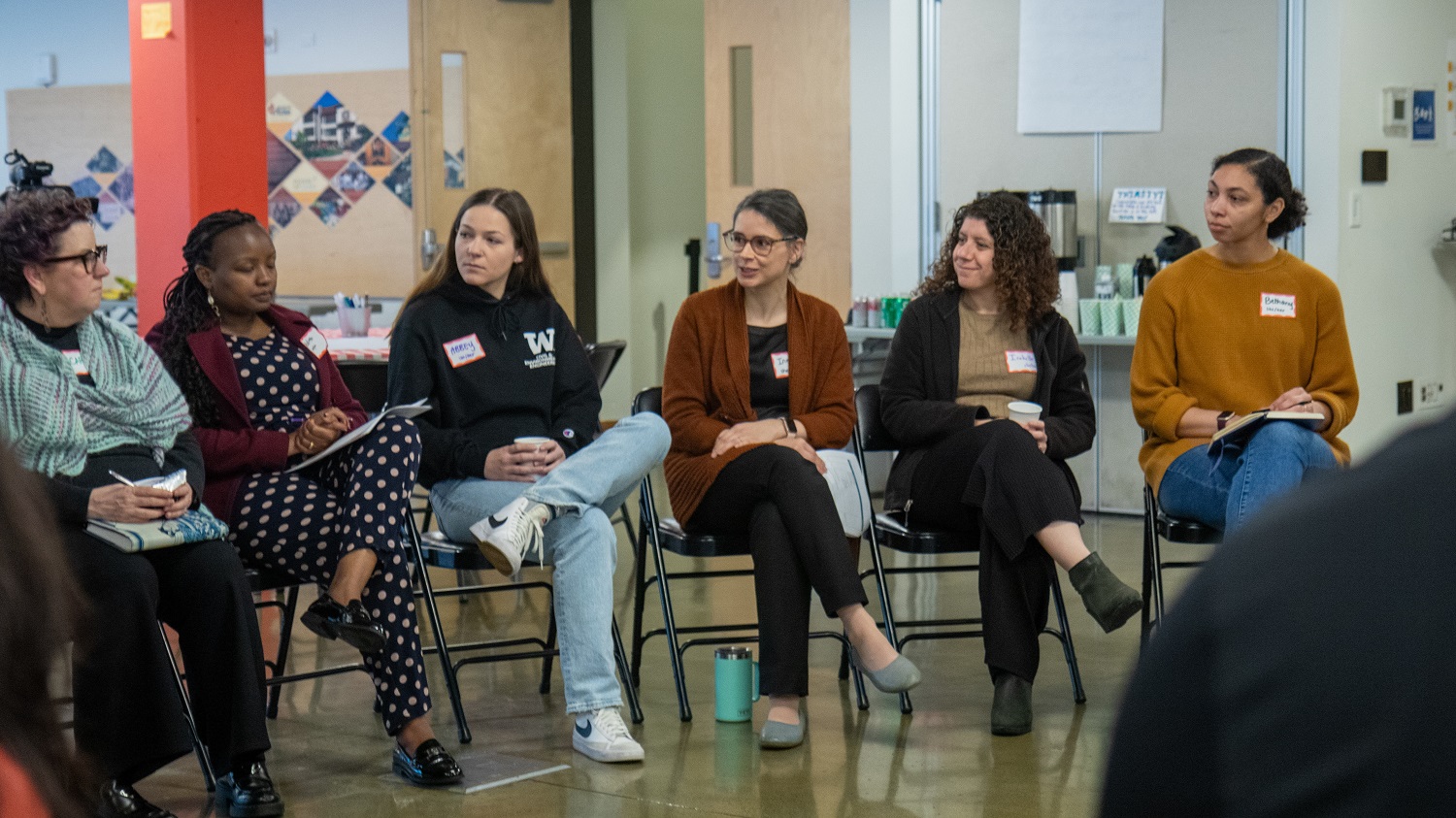
Interested in learning more?
- Read the recap newsletter.
- Check out the Public Service ReDesign Toolkit for tools and methods that were applied to host conversations at the inaugural Wolfle Action Lab @EPIC convening here.
- Collaborate with our EPIC policy lab!
Visiting Scholar: Five Questions with Kaisa Pietilä
The Evans School welcomes Kaisa Pietilä as a Fulbright Visiting Scholar for the 2023-24 academic year, where she will work with Professor Craig Thomas. Kaisa is a Senior Research Scientist at the Finnish Environment Institute (Syke) and is completing doctoral studies at Tampere University in Political Science (Environmental Policy). Before starting at Syke, Kaisa received her MPhil in Political Science from the University of Sheffield in England.
As is custom, the Evans School spoke with Kaisa about her research program as she settled into Seattle and Parrington Hall.
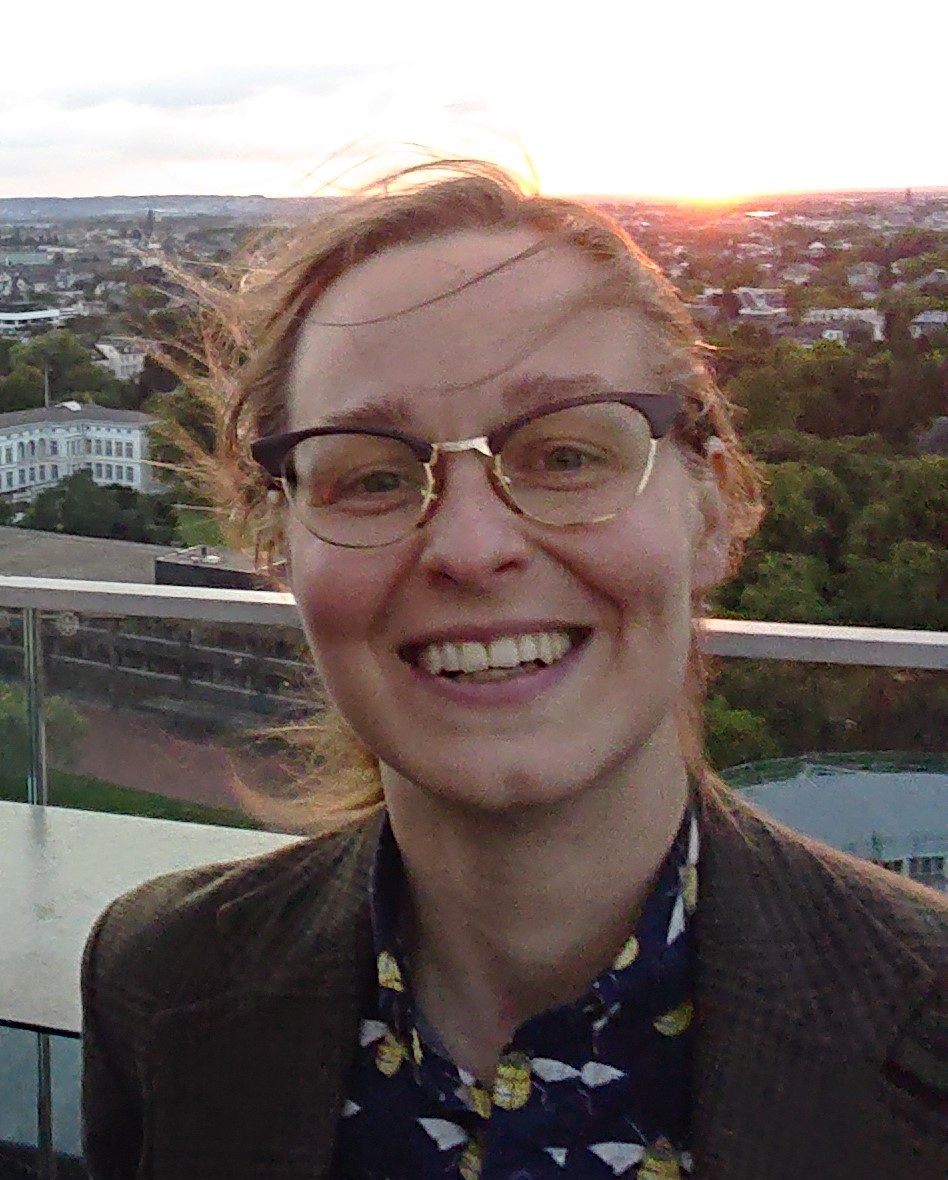
Evans: Huge congratulations on your Fulbright fellowship! Your work focuses on global biodiversity governance. How did you become interested in this area of research and policy?
KP: Thanks! My journey to working in and on global biodiversity governance has been a little unusual, as I have grown to be a more nature-y and outdoorsy person over time (currently on my way to becoming a millennial birder). I remember as an undergrad initially being intrigued by the history of conservation and colonialism, and how to me, there seemed to be a disconnect between the past and the more present discourses on sustainable development. I consider the disconnect between political decision-making on biodiversity and apolitical technical discourses and rationales to be at the heart of my research.
Evans: Central to your current work is the Convention on Biological Diversity (CBD). Describe the work of this Convention and why it is so important to understanding global responses to biodiversity loss.
KP: The CBD is one of the biggest international agreements – more than 190 countries are a member to it, with the significant absence of the US. The key purpose of the Convention is to bring countries together to negotiate and agree on what steps we should be taking to overcome biodiversity loss. In my research, I follow these intergovernmental negotiations and analyze how global biodiversity commitments come to exist. Now is a particularly exciting time for the CBD, as member countries collectively agreed on a new Kunming-Montreal Global Biodiversity Framework in December 2022 after 5 years of negotiating. The new goals and targets are intended to be met by 2030.
Evans: You are an ethnographer, but you describe yourself as a “practitioner-researcher.” Describe your unique approach to studying the work of nation states around biodiversity governance?
KP: I began my fieldwork as a standard ethnographer in the CBD conferences in 2018, which I attended as an academic observer. After joining Syke, a Finnish governmental research institute, in 2021, my role shifted as I participated in the negotiations as a member of Finland’s national negotiating team. In this role, I was no longer just observing from the sidelines but actively participating as a member of a government delegation. Being a practitioner-researcher is like wearing two hats at the same time!
Evans: What are the most striking findings from your current research program?
KP: I’m not sure whether it is much of a research finding but what certainly makes researching this topic a pleasure is that the people working in global biodiversity governance tend to be friendly, easy-going and of good humor. The latter I cannot emphasize enough – most often, global environmental governance negotiations consist of arguing over word choices and where to put a comma. So, on the negotiation table is simultaneously the fate of the planet and existential crisis of all people, together with some placement of commas.
Evans: In your recent talk at Evans, you noted that smaller nations are at a disadvantage compared to larger nations when working within international institutional structures like the CBD. Explain how these disparities in power and capacity downstream consequence for smaller nations.
KP: The CBD and other intergovernmental agreements, like the UN Climate agreement (UNFCCC), are ideally meant to be universal, applicable and implementable everywhere in the world. In order to achieve such an ideal, it would necessitate that all countries regardless of size or wealth be able to participate in the negotiations equally to influence the outcomes. The ideal and the reality are currently quite far from one another, which is why global environmental commitments are frequently unmet.
Evans: This is critical insight – thanks for sharing your work and ideas! Welcome to Evans and UW!
KP: Thank you! It would be great to connect with more Evans folks during my visit here, don’t hesitate to shoot me an email if you’d like to chat more about any of these topics (kaisa.j.pietila@tuni.fi).
Postdoc Profile: Five Questions with Brian F. O’Neill
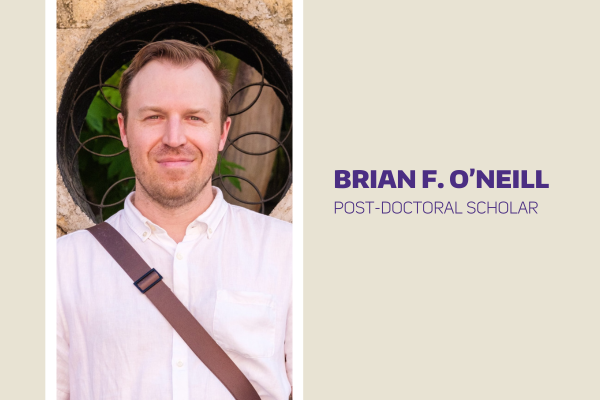
Brian F. O’Neill recently joined the Evans School of Public Policy & Governance and the Ocean Nexus Center as a postdoctoral scholar, where he will work with Evans faculty Grant Blume. He received his Ph.D. in Sociology from the University of Illinois at Urbana-Champaign and also completed doctoral-level work at l’Université Paris Sorbonne Nouvelle.
The Evans School caught up with Brian to discuss his research around climate change adaptations.
Evans: Thanks for chatting – it is exciting to have you join the Evans School community! Your work focuses on the discourse and practices around climate change adaptation. What are the key questions guiding your research in this area?
Brian: Unquestionably, adaptation to the impacts of climate change is now, and will continue to be, a key issue for societies. The question that I ask in my research, and that I also impart to my students, is: what is the nature of, and underlying interest in, adaptation as we currently observe it? So, my work often problematizes adaptation. Here, we can also think of terms like “greening,” and I have written a lot about the notion of “justice” in this context. I do this work because I want a more adaptative, more just society! However, the issue is that in my investigations, such as into natural gas drilling, seawater desalination, and wind energy, we continue to observe what some scholars have called “maladaptive” practices and policies that result from the complex interplay of social discourse, politics, economic policies, and subjectivities. So, a more just and adaptative society, for me, starts with a critical engagement with these terms, because none of them are stable. And, we should see the bright side in this. For example, while some of my work diagnosed how “environmental justice” has become co-opted in certain climate adaptation debates towards private, middle- and upper-class interests, the instability of “justice,” “adaptation,” “sustainability” also means it is still possible to re-assert their radical potential.
Evans: In your work, you draw upon an impressive range of methodological tools. Explain why it is so important to bring mixed methods strategies to the study of climate adaptations.
Brian: I have worked in different ways on different projects. Sometimes I have used generalized linear models, at other times participant observation and interviewing. Often I use archival and photographic means of data collection. In what was really my first formal investigation, as an undergraduate, I developed and distributed a public opinion survey instrument on natural gas drilling in the heart of what is called “fracking” country. What I realized was that certain quantitative tools are very adept at helping one describe what is happening in the world. Though, as I went through my graduate work, I found myself often drawn to studies that drew from a wide range of data collection techniques, and I became very inspired by the way scholars were trying to both describe and find new modes of explaining why their observations had manifested in the way they did. Thus, the need for combining quantitative and qualitative approaches. And so, if you are interested in the “social life of climate adaptation,” if I can put it that way, you find that we have some general indicators from surveys and polls, but because some of the technologies, like desalination are only now emerging, an ethnographic viewpoint incorporating multiple techniques of data collection provides unique insights that provide a clearer, but also more nuanced, picture of the issues at play.
Evans: You trained in France and have an upcoming research visit to l’École des Ponts Paris Tech (Laboratory for the Study of Technologies, Territories, and Societies) – what kind of work will you pursue during this visit?
Brian: Yes, my connections to France have been very important in my intellectual formation. In fact, one of the things I love about being a transnational scholar is that certain contexts afford different kinds of disciplinary and thematic flexibility. I developed a relationship with the Laboratory for the Study of Technologies, Territories, and Societies (LATTS) over the past couple of years because there were commonalities across the sociologists, but also human geographers, public policy scholars, and socio-economists working there in terms of an interest in problematizing the techno-solutionism/optimism around climate change and infrastructure. So, while I am there this winter, I will be building some relationships for future collaborative work in the Paris area, but also with some colleagues in Montpellier and Grenoble. I also have some ongoing article projects that I will be able to wrap up while I am there that are co-authored with French colleagues. The other big “to do” is to get a few initial chapters reworked for my book project, “Disciplining Waters,” for a university press that is all about the history, but also contemporary politics, of large-scale seawater desalting as a climate adaptive practice.
Evans: Just recently, you published a Comment in Nature Water with Joe Williams? What are the key takeaways from that piece?
Brian: Yes, Joe Williams (Cardiff University) and I have both been writing quite a lot about desalting as a climate adaptive policy. One takeaway is that there is a trend in how many technologies are being framed as “solving” the climate crisis, and desalination is one. But, if we look at that industry, it has yet to have any meaningful dialogue around social questions, about equity, about justice, and about representation. So, the second takeaway is to raise the issue in terms of: how technology is deployed matters. We point to evidence that shows how the industry routinely functions, not as a means to providing equitable, or even universal access under dire conditions, but as a result of servicing the privileged. Better regulations might be one answer, but we also argue that only way climate adaptation works at the moment is through forms of inequality, and so we are trying to recenter the debate to social concerns.
Evans: Share with us your plans for research while a post-doctoral fellow with Ocean Nexus?
Brian: One big plan is to secure a book contract for the “disciplining waters” project. Of course, another is to get the mounting pile of half written manuscripts off my desk and into journals! However, I have begun working with the Ocean Nexus Center’s Yoshi Ota, the Evans School’s Grant Blume, as well as Ocean Nexus colleague Matthew Jerome Schneider on a more long-term investigation into offshore wind politics. Specifically, I have been designing a comparative project with North Carolina and Washington in mind, sites chosen because of their differing, broad political dynamics. Within the scholarship on energy, there is a lot of new work coming out on wind, because it is a real bastion of the Green New Deal. In this new project, we will be looking at possible policy outcomes for labor, working class communities, and a variety of marginalized groups, but also trying to understand the underlying social, political, and economic motivations around wind. I am especially interested in troubling the extent to which wind is assumed to manifest a post-carbon economy. As this is a new issue, we hope to be able to observe these processes for at least the next several years to come. This is all early stages, but Evans has provided a great opportunity for me to develop this work.
Evans: We can’t wait to see how your work unfolds in the coming years – welcome again to the Evans School!
Brian: Thank you!
Evans Research Brief: What Parents Say About Using Washington Paid Leave for Physical Health
Evans Professor Heather D. Hill and MPA Student Diana Rucavado have published a new Evans Research Brief on Paid Family Medical Leave. The Washington Paid Family and Medical Leave Program (WA Paid Leave) provides up to 12 weeks of paid leave for workers who need time to care for their own medical needs, care for a familymember, or bond with a new child. In interviews with parents who used WA Paid Leave for physical health reasons, either their own or a family member’s, we find that the program allowed the parents to take the time needed to address health issues with less stress about work or income. However, for some taking leave was financially challenging or offered insufficient time for recovery or illness management. The findings of the study provide insight on how specific economic circumstances and/or health conditions affected workers’ experiences during leave.
Isabelle Cohen New Blog on Reducing Child Marriage in Northern Nigeria
Evans faculty Isabelle Cohen has blog post at VoxDev feature her collaborative work with Maryam Abubakar (Chief Technologist, Ahmadu Bello University, Zaria Nigeria) and Daniel Perlman (Girls Education Program Lead, OASIS) around a local intervention to reduce child marriage in Northern Nigeria.
Student Consulting Lab Project Shapes Wildland Firefighter Compensation Policy Conversation
Recent MPA grads Mohammed Alkhars, David Lu, Sam Perkins, and Evan Pierce are helping shape the conversation around wildland firefighter compensation through their capstone project. Not only have they talked with senate and congressional staffers about the report, it’s been picked up by media outlets including the Guardian, Al Jazeera, Washington Post, and NBC, among quite a few others.
Check out their Student Consulting Lab report.
